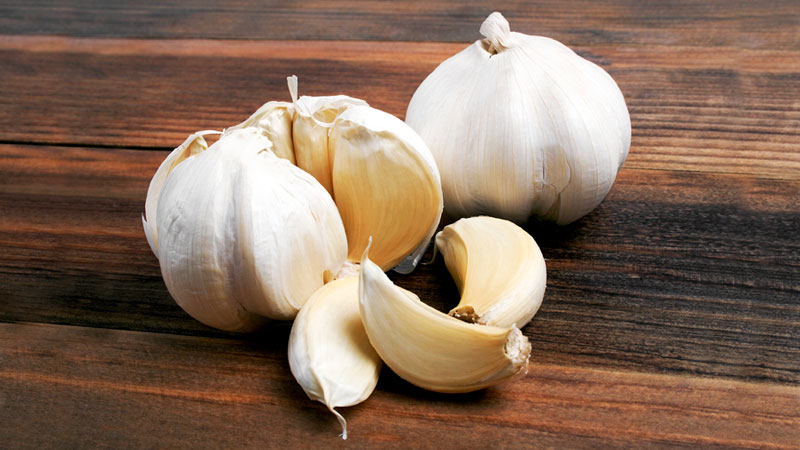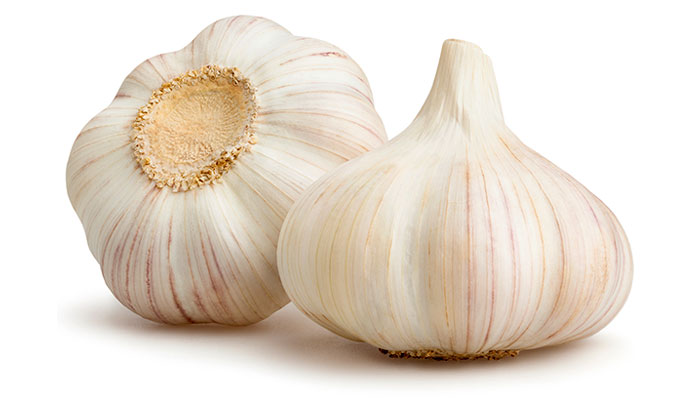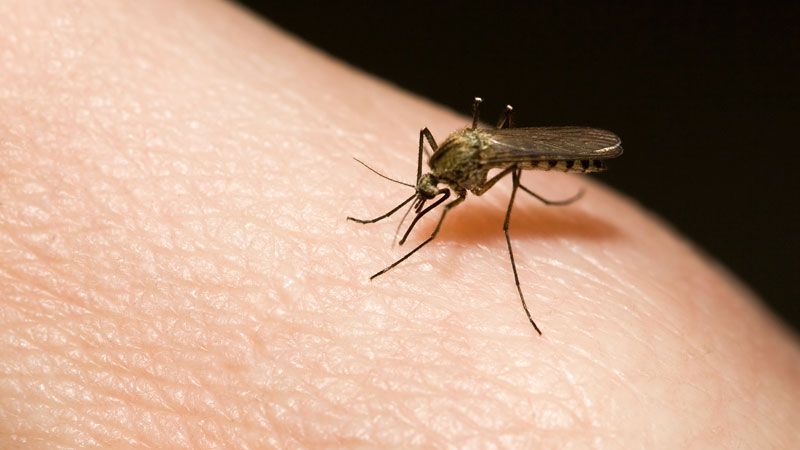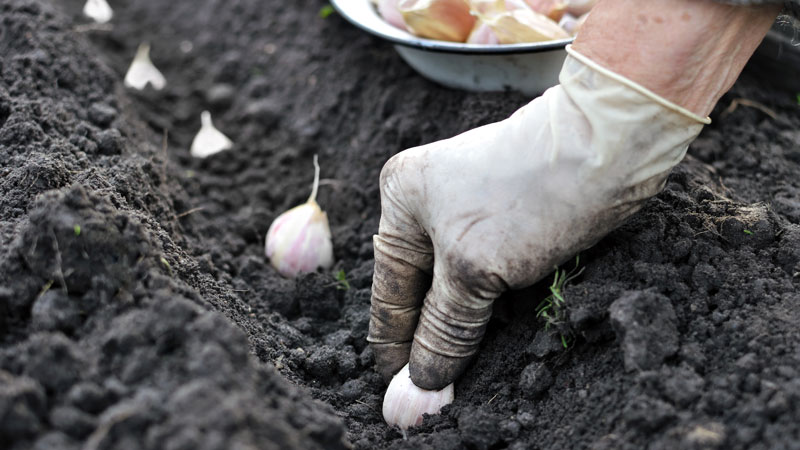Garlic has a very long and infamous history. In folklore, the pungent smell of garlic repelled demons who hunted by scent. The Catholic Church later applied the remedy as a means to ward off a wampyr (vampire) as they began to adapt folklore to fit in with Christian beliefs.
But all myths have a basis in fact, and it turns out that garlic does repel some critters of the night. So what is it about garlic that makes it so useful, and how can you apply it against unwanted pests?
Benefits of Garlic
Garlic (Allium sativum) has many benefits for both you and your garden. Here are just some of the ways this superfood can work wonders.
Garlic as a Superfood
When you buy garlic in the store, you tend to get entire bulbs. Each bulb contains segments known as cloves. The characteristic smell and heat of garlic occurs when the cell walls are broken down. In a rare case of size mattering, smaller cloves tend to have more potency when bruised or crushed.
As a human food, garlic has a wide range of benefits. Its many compounds aid in digestion, boost the immune system, and provide many valuable nutrients. Related species, such as onions and chives have similar qualities but to a much lesser degree.
Oddly enough, while garlic can kill many rodents, including hamsters and gerbils, it's actually beneficial to rats. It has been known to reduce the risk of infections, heart disease, and stroke. It also may help keep your rat slim.
However, too much can cause indigestion, so only give garlic to your pet rat in accordance with a vet's instructions to get the best results.
Garlic as a Personal Defense
Eating garlic can do more than just improve your health. The sulfur compounds and other byproducts of garlic consumption are excreted through your pores.
You can always tell who’s had Italian food in an infested home, because they’ll be the only ones not getting bitten by bed bugs, fleas, mosquitoes, or other biting pests.
Of course, they may also be identified by being the one other people avoid, if they consumed too much!
Using Garlic against Critters in the Garden
Garlic has several applications. While it can function as an organic pesticide (and fungicide), it is most often used as a repellent. Let’s take a look at both applications, as well as how you can use garlic remedies for home infestations.
Garlic as a Pesticide
Garlic has the ability to kill some insect species, although it functions better as a repellent. The sulfur and allicin found in garlic interfere with the sensory receptors of many insects. In fact, the Environmental Protection Agency (EPA) classifies garlic as a biochemical pesticide.
As an added benefit, sulfur can also be an effective fungicide, protecting against powdery mildew and several forms of leaf blight and fungal infections.
Garlic sprays function as a natural insecticide against a range of common garden pests when used on plant foliage.
These include: ants, aphids, bean beetles, cabbage worms, caterpillars, Colorado potato beetles, diamondback moths, fruit borers, june bugs, leafhoppers, mosquito larvae, moths, rose chafers, slugs, snails, spider mites, squash bugs, termites, and whiteflies.
It will also kill army worms, carrot flies, codling moths, fungus gnats, Japanese beetles, nematodes, and root maggots when used as a ground treatment.
See Also: Does Bleach Kill Maggots?
Commercial Garlic Pest Repellent
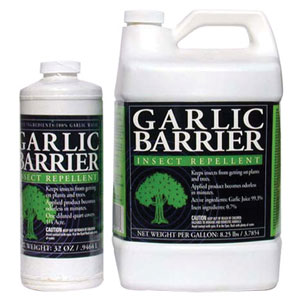
One company, the aptly named Garlic Research Labs, offers a range of finely-tuned garlic repellent sprays in sizes ranging from 32 ounce concentrate for gardens to 1 gallon bottles for orchards and larger farmlands.
Their products are a blend of ingredients, making them safe around pets (although we wouldn’t recommend allowing access to spray areas for an hour or so after application).
DIY Garlic Pest Repellent
There are a wide range of recipes available for use in the garden. A good rule of thumb is to apply twice per week when spraying foliage and once per week when spraying the ground.
It’s also best to begin spraying early in the growing season and after a rain. Try to only spray parts of the plant that are infested, and aim to apply in early morning or late evening to reduce the risk to honeybees.
When mixed with hot peppers, garlic can repel a wide range of larger critters. Not only is the smell offensive, the capsicum will irritate the feet of many critters. These include deer, elk, mice, rabbits, raccoons, rats, and voles.
Dishwashing soap, such as Dawn, breaks down the water’s surface, allowing the spray to clog the breathing holes of insects, suffocating them.
Here are a few different recipes to try. Make sure to wash any treated produce before eating to get any soap off of them. As every situation is unique, one may work better for you than another.
Also, keep in mind that using cloves of garlic as opposed to garlic powder or commercial garlic extract will prove more potent.
Recipe #1 (Makes 3 cups)
- 3 hot peppers
- 3 garlic cloves
- 1 small onion
- 1 tablespoon dish soap
Puree the ingredients and mix in the dish soap. Steep in 3 cups of water for a day, then strain using a cheesecloth. Place the resulting liquid in a spray bottle.
Recipe #2 (makes 1 gallon)
- 2 garlic bulbs
- 2 hot peppers (such as jalapeno or cayenne pepper)
Add to a blender or food processor half full of water and liquify. Strain using cheesecloth and pour into a gallon container. Top with more water.
Recipe #3 (makes 1 quart concentrate)
Simply crush 4-5 medium cloves garlic and add to 1 quart water. Allow to steep. Strain through cheesecloth and add 4-5 drops of dishwashing soap. Keep refrigerated in an airtight container until needed. To use, add 2.5 cups water and put in a sprayer.
Garlic and Companion Planting
One of the best kinds of organic gardening is a method called companion planting, AKA inter-cropping. This allows you to grow a tightly packed garden full of plants that not only provide both beauty and food, but the plants protect and benefit each other, fighting pests, disease, and weeds for you.
As a companion plant, garlic works well when planted near cabbage, carrots, celery, fruit trees, lettuce, roses, or tomatoes. Avoid planting beside legumes, peas, or potatoes, as planting too close may stunt their growth.
However, planting garlic nearby has been known to improve the flavor of beets, cabbage, and peas.
Using Garlic in the Home
As mentioned before, garlic can be toxic to most pets. You’ll want to avoid using any garlic products where pets have access.
However, you can still take advantage of garlic to some extent. Leaving a small bruised clove in your pantry, for example, may produce enough smell to repel many pests.
How Effective is Garlic?
When using garlic as a natural insect repellent, it’s important to remember that no method (chemical or natural) is 100% guaranteed. Its repellent effects won’t stop a critter that’s literally starving. Also, the concentrations of garlic used can have varied effects. You may need to experiment to find the garlic mixture that works best for you.
Try to always use a fresh head of garlic for the best effects. You will also need to reapply garlic outdoors after it rains. Finally, don’t forget the toxicity of garlic on pets and some beneficial critters.
Using garlic against pests is easy and highly effective. While it might not be useful against a large infestation, it can help to keep smaller populations under control.
- How to Get Rid of Hawks - March 8, 2024
- How to Get Rid of Pill Bugs (Rolly Pollies) - March 1, 2024
- How to Get Rid of Groundhogs (Woodchucks) - February 5, 2024

